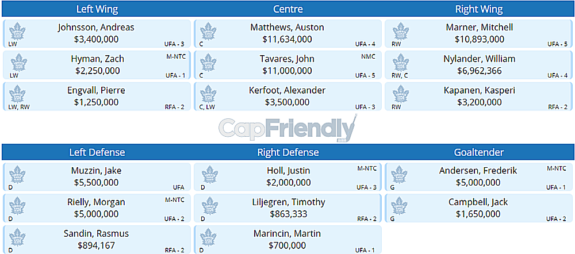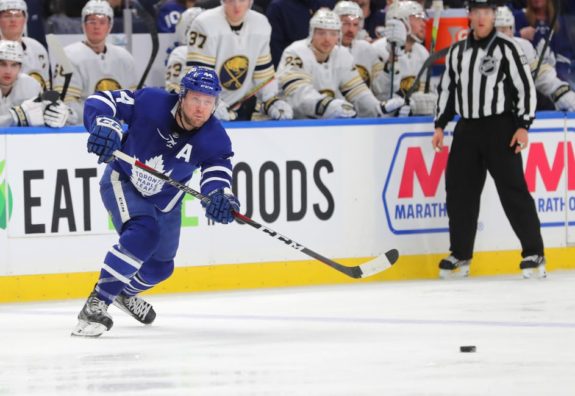Amid the buzz of the playoff hunt and impending trade deadline, the Toronto Maple Leafs are making moves behind the scenes. Most notably, they’re reportedly inching towards a long-term contract extension with defenceman Jake Muzzin.

According to TSN’s Darren Dreger, Muzzin and the Maple Leafs are putting the finishing touches on a deal that could be finalized within the next couple of weeks. Dreger’s colleague, Pierre LeBrun, added his own speculation about the terms of the contract:
Dollars and cents aside, extending the team’s best defender makes perfect sense for the Maple Leafs, who have long struggled to keep the puck out of their net. However, even a reasonable deal around $5.5 million per year will have serious salary cap implications for the Maple Leafs. Couple that with their surplus of left-handed defencemen, and we could some big changes on the blue line for Toronto in the coming weeks or months.
Making Sense of the Cap Crunch
Much has been made of the Maple Leafs’ unique roster makeup, with about half of their money allocated to their top-four forwards – Auston Matthews, John Tavares, Mitch Marner, and William Nylander currently earn a combined $40.5 million per season. While each star has more or less earned their keep, their hefty paychecks have left the team in a somewhat precarious position, with just $41 million left to fill out the remaining 16 roster spots.

In practicality, that means the Maple Leafs have to extract excellent value from their less expensive players, and we’ve seen that in full view this season – veteran Jason Spezza took the league minimum $700,000 to come home to Toronto last summer, Russian import Ilya Mikheyev was lured across the world for $925,000, and the Maple Leafs are currently icing five players on entry-level contracts. In other words, there isn’t a lot of room for excessive spending or costly mistakes if the team wants to remain competitive.
Projecting to next season, Toronto’s cap situation actually looks pretty good, especially with the league’s salary cap reportedly rising to around $83.5 million. Factoring in the rumoured Muzzin extension, the team will have over $6.5 million to bring back Spezza plus their crop of restricted free agents: Mikheyev, Frederik Gauthier, Dmytro Timashov, and Travis Dermott.

While the money all adds up, you’ll probably notice one glaring weakness: the defence, particularly on the right side. With a fantastic one-two punch of Muzzin and Morgan Rielly on the left side, plus up and coming youngsters in Sandin and Dermott, you could argue that the Maple Leafs have an excess of talent on left defence. Meanwhile, they will have just one legitimate NHLer on the right in Holl once Tyson Barrie walks to free agency. Add in the fact that neither Muzzin nor Rielly are comfortable on their off-side, and you’ve got a serious issue that needs to be addressed moving forward.
You could certainly make the case that Toronto’s right side on defence has been sub-par this season with Holl, Barrie, and Cody Ceci manning the blue line, but at least those are all proven NHL defencemen. Going into 2020-21 with a right side of Holl, Timothy Liljegren, and possibly Dermott on his off side frankly sounds unacceptable for a team with Stanley Cup aspirations.
Reading between the lines, things are pointing to a pretty substantial trade in the near future. The question is not if but when, and who is on their way out of Toronto?
Why It Makes Sense to Trade Rielly
Let’s get the controversial one out of the way first: it would make a lot of sense for the Maple Leafs to trade Rielly this offseason in order to address their weakness on the right side of defence.

Outside of the aforementioned top-four forwards, who are basically untouchable, the Maple Leafs’ No. 1 defenceman likely has the highest trade value. While Rielly hasn’t had the best season (he’s struggled defensively while on pace for just 48 points), he is just one year removed from a career-best 20-goal, 72-point campaign that saw him enter the Norris Trophy conversation. Trading Rielly this summer might not qualify as a case of selling high, but it would still maximize the team’s potential returns.
Related: Toronto Maple Leafs Won’t Get the Same Morgan Rielly This Season
The other factor to consider in moving Rielly is his contract situation. His current deal expires in the summer of 2022, making him an unrestricted free agent at age 28. He’ll be seeking a sizable raise over the $5 million per season he’s presently earning.
Looking around the league we can get a general sense of what Rielly may command on his next contract. Nashville Predators defenceman Roman Josi probably provides the best comparable as he and Rielly have nearly identical play styles and stats: Rielly has averaged 43 points per 82 games over his career while Josi has averaged 39 (albeit Josi plays two minutes more per night). The Predators captain signed an eight-year, $72.5 million extension last October, giving him a cap hit of $9 million per year through his age 30 to 37 seasons.

Going a step down, even New York Rangers defenceman Jacob Trouba earned a hefty payday from his new team last summer, signing a seven-year deal that will see him pocket $8 million per season from age 25 to 31. A strong defenceman in his own right, Trouba contributes less offensively (36 points per 82 games) and sees less ice time than Rielly. That should tell you all there is to know about the future of contracts in the NHL, as star (or even just very good) players are being paid more than ever.
That said, Rielly will likely command something in the neighbourhood of the Josi deal which was equivalent to 11.12 percent of the salary cap. Assuming the NHL’s salary cap rises conservatively to $86 million for the 2022-23 season, that would give Rielly a projected contract of about $9.5 million per season over seven or eight years.
Could the Maple Leafs afford that kind of deal by then? It’s hard to say definitively given how much roster turnover there can be, especially in Toronto, but given the craftiness of general manager Kyle Dubas and his front office, I’d lean strongly towards yes. The real question is whether they’ll want to shell out that kind of cash for a player that’s almost certainly past his prime. It seems like that projected Rielly contract would provide a ton of risk down the road, and those are exactly the kinds of contracts that Dubas and co. will need to avoid to stay competitive long-term.

Now I already hear the counterarguments: you’re warning against signing Rielly from age 28 to 34, meanwhile the Maple Leafs are about to extend a soon-to-be 31-year-old Muzzin until he’s 35. To be fair, it’s a pretty sound argument. However, there are two real differences: 1) the dollar value of the respective contracts, and 2) the fit and trade value of each player.
If Muzzin signs for the $5.5 million that’s rumoured, that’s a relatively easy contract to handle or move (with retained salary), even if his play does trail off. He’s also easily the best defender on the team (head coach Sheldon Keefe calls him their “conscience”), which makes him that much more important.
Rielly, on the other hand, will be seeking $9-10 million on his next deal as a 50 or 60-point offensive defenceman that gives a lot back in his own zone. His skill set is also pretty redundant given the team’s strengths and the development of younger, cheaper players like the 19-year-old Sandin. And it goes without saying that Rielly’s value would be significantly higher than Muzzin’s in a trade as he could likely land a top-pairing right-handed defenceman, or at least a top-four defender plus other pieces.
Trading Rielly could be a bold yet perhaps necessary move if things don’t go according to plan for the Maple Leafs over the next couple of months.
Why It Makes Sense to Trade Dermott
The easier (and generally more popular) option would be to trade Dermott instead. The hope is that with a multi-piece package including Dermott, Kasperi Kapanen, and a pick or prospect, the Maple Leafs could land a substantial upgrade at right defence.
The idea sounds fine in principle: Dermott hasn’t made the jump that he was expected to, and now at 23 years old he’s nearing the point where what you see is what you get. If he’s no more than a third-pairing defenceman, then he’s expendable for the Maple Leafs. At the same time, though, he’s still young enough and has enough talent that he would have some value on the trade market, especially when packaged with another valuable, potentially expendable piece like Kapanen.

Once you look at the current trade market, though, this route seems much less appealing.
The top right-handed defencemen that may be on the trade market right now include Josh Manson, Matt Dumba, Jeff Petry, Sami Vatanen, and Dylan DeMelo. We can more or less scratch off most of these names right now: Dumba, Vatanen, and DeMelo don’t provide huge upgrades over Dermott, and the asking price for Petry (who I personally love) is likely too high. That leaves us with Manson, who has been connected to Toronto for years now. The issue with him is that the Anaheim Ducks’ front office loves him and likely wouldn’t want to sell low during a down year for the 28-year-old.

Unless Dubas has an ace up his sleeve and is targeting someone that isn’t necessarily on everyone’s radar (which he has done before, to be fair), it’s hard to see how the Maple Leafs use such a package to get a deal done before the deadline.
Related: Maple Leafs Must Make a Splash Ahead of Trade Deadline
The alternative would be to wait until the offseason and hope that a suitable piece becomes available then. You’ll remember, of course, that the Maple Leafs acquired Barrie, their hope for a top-pairing right-handed defenceman, with a similar type of deal last summer. That will likely be the scenario this time around, too, regardless of which pieces they choose to part with.
Get the latest Toronto Maple Leafs news, rumors, commentary and analysis